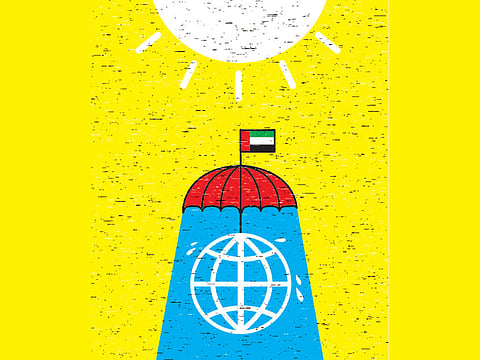UAE leads climate change action in the Middle East
It has the opportunity to influence oil-producing states to develop sustainable energy and greener policies

This week, the world’s leading climate change decision-makers, researchers, businesses and NGOs will gather in Germany for the 23rd annual United Nations Climate Change Conference of the Parties (COP23). These communities will be working hard to detail the rules to implement the Paris Climate Agreement and identify new ways to meet the ambitious goal of keeping global warming below 1.5 degrees Celsius.
There has never been a more urgent time for action. Only last week, scientists published the sobering news that global carbon dioxide levels, the main gas responsible for warmer temperatures and climate change, reached new record levels. With frequent global weather events like intense hurricanes and heatwaves, it is easy to see that climate change impacts are already being felt.
Unfortunately, implementation of the existing climate pledges made by countries will fall short of the goals of the Paris Agreement and warm the planet by about 3-4 degrees Celsius this century, with devastating consequences for our planet, people and wildlife. However, there is now also unprecedented action and momentum on climate change. The challenge is how fast can we make the changes required to avoid the worst climate impacts and prepare to adapt to the unavoidable ones.
More governments, businesses, cities and non-state actors are collaborating to address the issue, with renewable energy, along with energy efficiency, forming the bedrock of solutions to reduce carbon dioxide emissions. Forty-eight of the most climate-vulnerable countries in the world have set targets to be powered 100 per cent by renewable energy by 2050. Renewables-based projects have already taken off in the Middle East and North Africa region. Morocco, for example, has set a target to generate 52 per cent of its energy from renewables by 2030 and its pledge to the UN was assessed by the Climate Action Tracker (an independent group assessing national climate goals) as the only one globally being compatible with a 1.5 degrees Celsius temperature limit.
Demand-reduction goal
The UAE has seen substantial momentum on climate action and was the first major oil producer from the Gulf Cooperation Council region to officially ratify the Paris Agreement. Since submitting its Nationally Determined Contribution in 2015, the UAE has adopted more ambitious goals and policies. There is now a 44 per cent national renewable energy target and a 40 per cent energy demand-reduction goal for 2050, in addition to a national climate change plan. These initiatives are further supported by the water security strategy. Additionally, Emirate-based entities spanning a range of sectors are also adopting initiatives to move towards low-carbon development. The UAE also recently joined the Climate Leadership Network, of which my organisation (WWF) is a member, to promote more action to close the ‘emissions gap’. These efforts indicate that action on climate change is recognised as critical to the future growth and development of the country.
The UAE is already seen as a leader on climate action in this region and has an incredible opportunity to influence oil-producing nations to develop sustainable energy and climate change policies, and further engage the private sector in these initiatives. Businesses are showing increasing appetite to move in this direction, with many in the UAE beginning to measure, report and reduce their carbon dioxide emissions.
All sectors of society have a crucial role to play. Through our climate and energy projects, EWS-WWF, we are playing a critical role in facilitating and catalysing climate action and we are committed to continue working with like-minded partners to drive action in the UAE and the region. We have no option to fail, for there is no Planet B!
Dr Deepti Mahajan Mittal is Programme Leader — Climate and Energy, Emirates-Wildlife Society-WWF.



